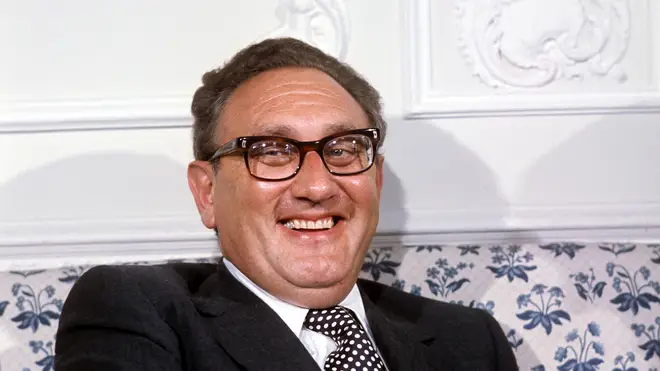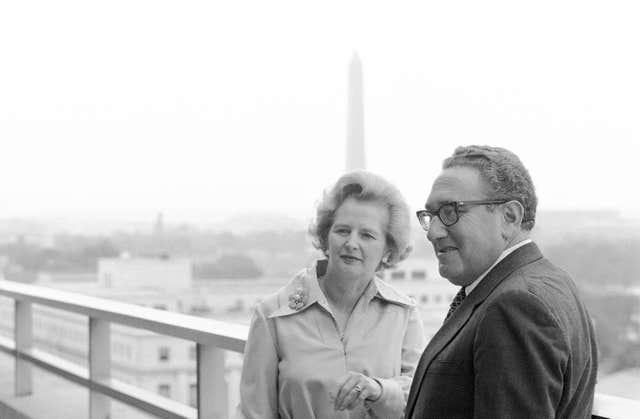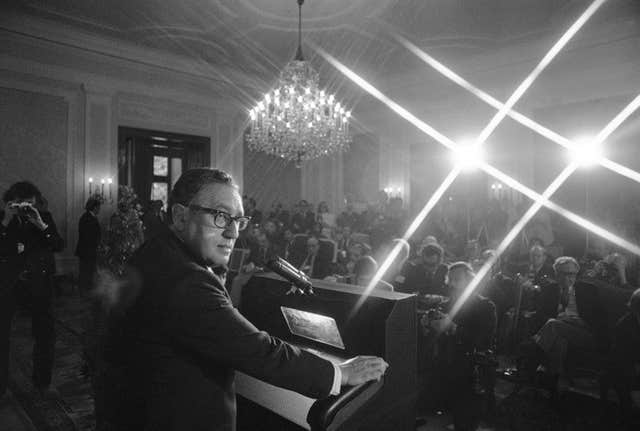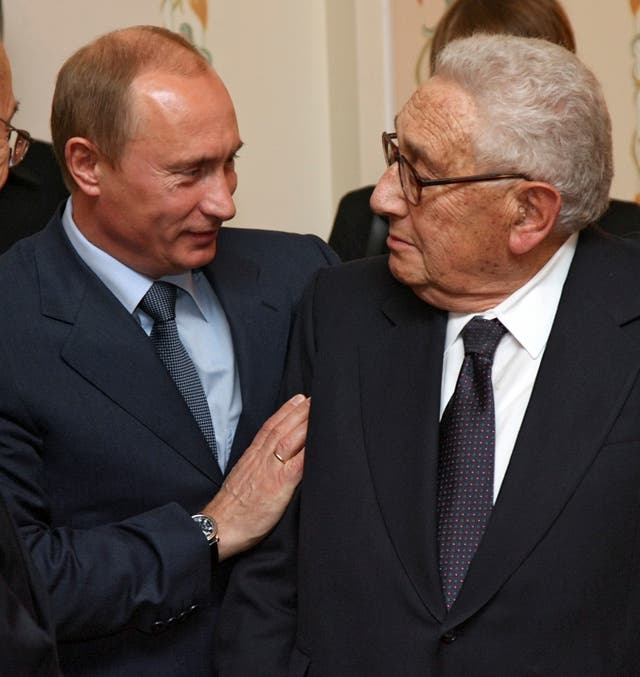
Vanessa Feltz 3pm - 6pm
30 November 2023, 08:14

The German-born US diplomat died at his home in Connecticut on Wednesday. He was 100.
Decades later, the scene is still almost too bizarre to imagine: a tearful president and his perplexed aide, neither very religious, kneeling on the floor of a White House bedroom in prayer in the waning hours of a shattered presidency.
Until the bitter end, Henry Kissinger was one of the trusted few in Richard Nixon’s tight circle. That trust, combined with Mr Kissinger’s intellectual heft and deft manipulation of power, made him a pivotal player in a tense period in American history, a giant of US foreign policy and a fixture in pop culture who stood witness to some strange moments in the White House.
The German-born diplomat who got the US out of Vietnam after bloody, costly years of delay and into China in a sudden burst of secret diplomacy died on Wednesday at his home in Connecticut. He was 100.

With his gruff yet commanding public presence and behind-the-scenes manoeuvres, Mr Kissinger exerted unprecedented influence on global affairs under presidents Mr Nixon and Gerald Ford.
His power grew during Watergate, when he took on a role akin to co-president to the discredited Mr Nixon.
“No doubt my vanity was piqued,” Mr Kissinger later wrote of his expanding influence. “But the dominant emotion was a premonition of catastrophe.”
A Jew who fled Nazi Germany with his family in his teens, Mr Kissinger in his later years cultivated the reputation of respected statesman, giving speeches, offering advice to Republican and Democratic presidents alike and managing a global consulting business.
He turned up in Donald Trump’s White House on multiple occasions. Initially, he told PBS NewsHour last year, he had some sympathy with Mr Trump’s views about America’s national interests. But he lost enthusiasm as Mr Trump became “so centrally focused on one person” — himself — and turned issues into confrontations.
“At the end,” he said, “for an American president to challenge the constitutional system and to try to overthrow the constitutional system is a grave matter. And I find no excuse for that.”
After he left government, Mr Kissinger was dogged by critics who argued that he should be called to account for his policies on Southeast Asia and support of repressive regimes in Latin America.

For eight years — first as national security adviser, later as secretary of state, and for a time holding both titles — Mr Kissinger ranged across the breadth of major foreign policy issues. He conducted the first “shuttle diplomacy” in the quest for Middle East peace. He used secret channels to pursue ties between the United States and China, ending decades of isolation and mutual hostility.
He initiated the Paris negotiations that ultimately provided a face-saving means to get the US out of Vietnam. Two years later, Saigon fell to the communists, leaving a bitter taste among former US allies who blamed Mr Nixon, Mr Kissinger and Congress for abandoning them.
And he pursued a policy of detente with the Soviet Union that led to arms-control agreements and raised the possibility that the tensions of the Cold War and its nuclear threat did not have to last forever.
Mr Kissinger was a practitioner of realpolitik — using diplomacy to achieve practical objectives rather than advance lofty ideals. Supporters said his pragmatic bent served US interests; critics saw a Machiavellian approach that ran counter to democratic ideals.
He was faulted for authorising telephone wiretaps of reporters and his own National Security Council staff to plug news leaks in Mr Nixon’s White House. He was denounced on college campuses for the bombing and allied invasion of Cambodia in April 1970, intended to destroy North Vietnamese supply lines to communist forces in South Vietnam.
That “incursion”, as Mr Nixon and Mr Kissinger called it, was blamed by some for contributing to Cambodia’s fall into the hands of Khmer Rouge insurgents who later slaughtered some two million Cambodians.
Mr Kissinger sought to debunk what he referred to as a “prevalent myth” that he and Mr Nixon had settled in 1972 for peace terms that were available in 1969. He insisted the only way to speed up the withdrawal of US troops would have been to overthrow the government of South Vietnam.
Pudgy and messy, Mr Kissinger incongruously acquired a reputation as a ladies’ man in the staid Nixon administration. Mr Kissinger, who divorced his first wife and mother of his two children in 1964, called women “a diversion, a hobby”. He married Nancy Maginnes, a researcher for Nelson Rockefeller, in 1974.

Gallup found Mr Kissinger was the most admired man in America in 1972 and 1973, the year he won the Nobel Peace Prize with Le Duc Tho, North Vietnam’s chief negotiator, for the accord under which America pulled out of South Vietnam. Tho declined the award.
And yet Mr Kissinger was reviled by many Americans for his conduct of wartime diplomacy. When Columbia University proposed giving Mr Kissinger a teaching post after he left government in 1977, the idea drew such strong protest that the job never materialised. In 2015, an appearance by the 91-year-old Mr Kissinger before the Senate Armed Services Committee was disrupted by protesters demanding his arrest for war crimes and calling out his actions in Southeast Asia, Chile and beyond.
Mr Kissinger told colleagues at the White House he was the one person who kept Mr Nixon, “that drunken lunatic”, from doing things that would “blow up the world”, according to Walter Isaacson, who wrote the 1992 biography Kissinger.
The two men shared an ambivalent personal relationship, Mr Kissinger writing in his memoirs that “deep down one could never be certain that what one found so disturbing in Nixon might not also be a reflection of some suppressed flaw within oneself”.
Heinz Alfred Kissinger was born in the Bavarian city of Fuerth on May 27 1923. Mr Kissinger’s family left Nazi Germany in 1938 and settled in Manhattan, where Heinz changed his name to Henry.
Drafted during the Second World War, he was assigned to army counterintelligence and worked on reorganising municipal governments in occupied Germany. He was educated at Harvard and wrote a 1957 book, Nuclear Weapons And Foreign Policy, which established his reputation as an expert on global diplomacy.
In 1968, Mr Kissinger offered himself as speechwriter and adviser to Mr Rockefeller, who was seeking the Republican presidential nomination. When Mr Nixon won the election, he invited Mr Kissinger to be his national security adviser. Mr Kissinger took the job, although he had “spent 12 years of my life trying to keep him from becoming president”, he later recalled.

From the start, Mr Kissinger and Mr Nixon manoeuvred to keep control over foreign policy in their hands and away from secretary of state William Rogers and the State Department career diplomats, whom they both scorned.
During his 39 months as secretary of state between 1973 and 1977, Mr Kissinger flew hundreds of thousands of miles, conferring with world leaders and trying to resolve the Arab-Israeli conflict.
In 1971, Mr Kissinger feigned a stomach illness during a visit to Pakistan and vanished on a secret trip to Beijing that laid the groundwork for Mr Nixon’s historic visit to China in 1972.
One of the strangest moments in Mr Kissinger’s life occurred on August 7 1974, the night before Mr Nixon gave up his fight to retain the presidency. Mr Nixon summoned Mr Kissinger to the family quarters in the White House, and they spent 90 minutes together.
As Mr Kissinger was leaving, Mr Nixon steered him into the Lincoln Bedroom and suggested they kneel in prayer. And so they did — the Quaker-born Mr Nixon, the Jewish-born Mr Kissinger, on the floor, Mr Nixon in tears about the unfairness of his fate. Returning to his office, Mr Kissinger told his closest aides: “He is truly a tragic figure,” Mr Isaacson wrote.